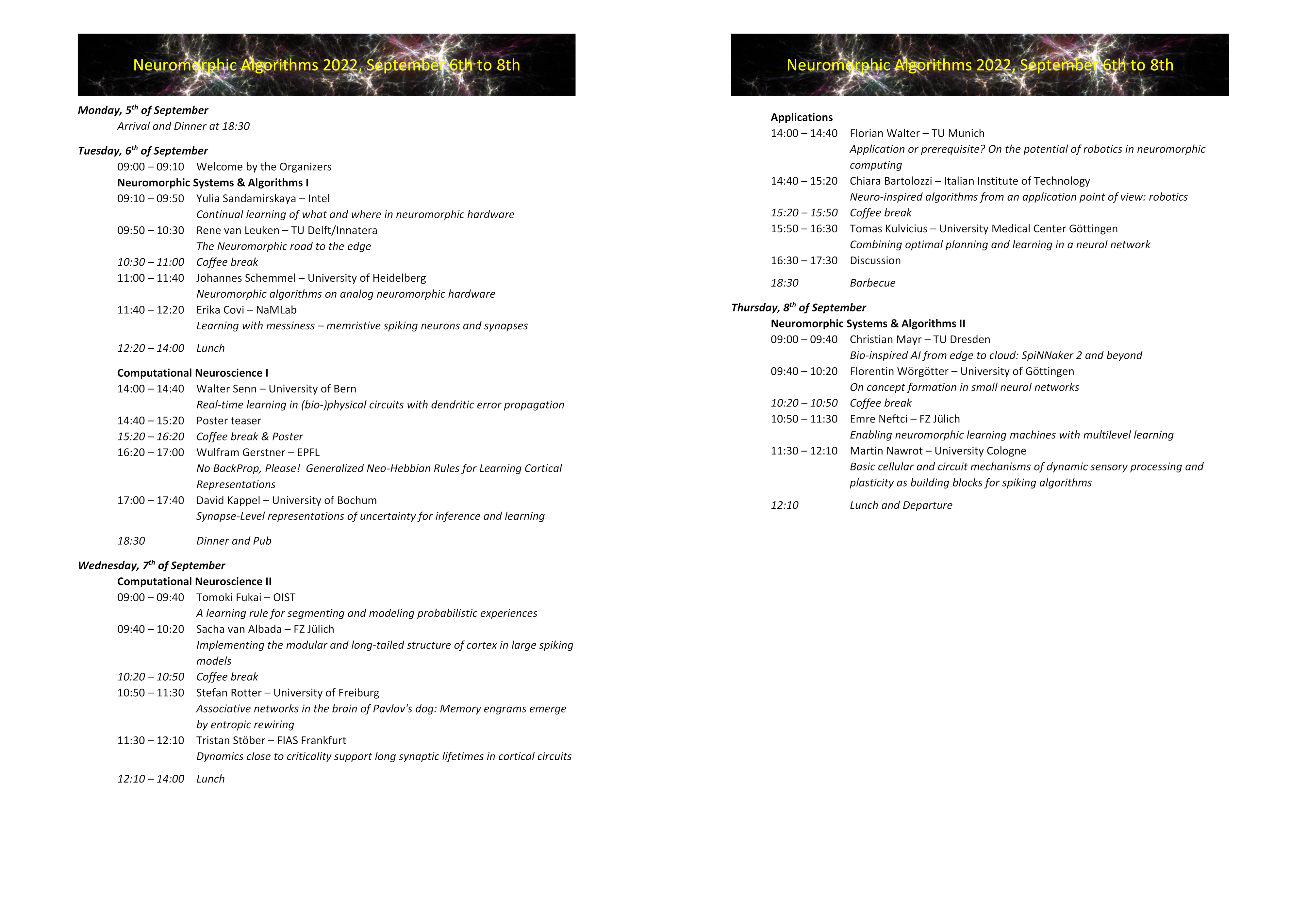Contents
Topic
Neuromorphic Algorithms brings together experts from the scientific fields of neuromorphic computing, computational neuroscience, and robotics to discuss requirements, problems and solutions to realize successful algorithms advancing neuromorphic computing.
Dates and Venue
Despite the corona pandemic, we are striving for an in-person meeting. The venue is a resort in Volpriehausen nearby the university city Göttingen in the heart of Germany, that is easily accessible by train and flights. The workshop will take place September 6th to 8th.
Agenda
Confirmed Speakers
- Sacha van Albada leading the Theoretical Neuroanatomy group at Forschungszentrum Jülich, Germany
- Chiara Bartolozzi leading the Event-Driven Perception for Robotics group at the Italian Institute of Technology, Italy
- Erika Covi leading the MEMRINESS (Memristive Neurons and Synapses for Neuromorphic Edge Computing) project at NaMLab, Germany
- Tomoki Fukai head of the Neural Coding and Brain Computing Unit group at the Okinawa Institute of Science and Technology Graduate University, Japan
- Wulfram Gerstner Director of the Laboratory of Computational Neuroscience LCN at the EPFL, Switzerland
- David Kappel Postdoctoral Researcher, https://www.ini.rub.de/
- Tomas Kulvicius Postdoctoral Researcher, University of Göttingen, Germany
- Rene van Leuken staff member of the Circuits and Systems group at the Delft University of Technology and Innatera, Netherlands
- Christian Mayr chair of Highly-Parallel VLSI Systems and Neuro-Microelectronics at TU Dresden, Germany
- Martin Nawrot head of Computational Systems Neuroscience at University of Cologne, Germany
- Emre Neftci head of Neuromorphic Software Ecosystems at Forschungszentrum Jülich, Germany
- Stefan Rotter Managing Director of the Bernstein Center Freiburg at Albert-Ludwigs-Universität Freiburg, Germany
- Yulia Sandamirskaya senior researcher at Intel Labs, Germany
- Johannes Schemmel group leader of Electronic Vision(s) at Heidelberg University, Germany
- Tristan Stöber Postdoctoral Researcher, Frankfurt Institute for Advanced Studies, Germany
- Walter Senn leading the Computational Neuroscience Group at University of Bern, Switzerland
- Florian Walter research assistant in the Neurorobotics research group at Technical University of Munich, Germany
- Florentin Wörgötter head of the Department of Computational Neuroscience at University of Göttingen, Germany
Participants
- Alexander Hadjiivanov “Neural homeostasis and adaptation enable continuous learning in spiking networks”
- Alpha Renner, Lazar Supic, Andreea Danielescu, Giacomo Indiveri, Friedrich Sommer, Paxon Frady and Yulia Sandamirskaya “Towards Neuromorphic Visual Localization and Mapping”
- Ana Stanojevic, Stanislaw Wozniak, Guillaume Bellec, Giovanni Cherubini, Angeliki Pantazi, Evangelos Eleftheriou and Wulfram Gerstner “Equivalence Of Relu And Single-Spike Neural Networks”
- Anand Subramoney “Beyond biologically plausible spiking networks for neuromorphic computing”
- Atreya Majumdar, Mona Ezzadeen, Marc Bocquet, Tifenn Hirtzlin, Axel Laborieux, Jacques-Olivier Klein, Etienne Nowak, Elisa Vianello, Bastien Giraud, Jean-Philippe Noël, Francois Andrieu, Jean-Michel Portal and Damien Querlioz “Inference and Training in Resistive RAM-based Implementation of Binarized Neural Networks”
- Chen Li, Lei Ma and Steve Furber “Quantization framework for fast spiking neural networks”
- Dominik Dold “Relational representation learning with spiking neural networks”
- Evan Eames and Camilo Amaya Spiking “Reinforcement Learning for Robotic Object Insertion on Loihi”
- Filippo Costa, Giacomo Indiveri and Johannes Sarnthein “Pattern detection in intracranial EEG by sparse, modular and spike-based time series encoding”
- Giorgia Dellaferrera and Gabriel Kreiman “Error-driven Input Modulation: Solving the Credit Assignment Problem without a Backward Pass”
- Jakob Kaiser “Multi-compartment neuron emulations on BrainScaleS-2”
- Jan Finkbeiner and Emre Neftci “Exploiting Sparsity for Accelerated SNN Training on Graphcore IPUs”
- Jens Egholm Pedersen, Juan Pablo Romero Bermudez and Jörg Conradt “Coordinate regression with Spiking Neural Networks”
- Maryada Maryada and Giacomo Indiveri “Neuromorphic-compatible cortical model for working memory and decision-making”
- Matteo Farronato, Piergiulio Mannocci, Saverio Ricci, Margherita Melegari, Christian Monzio Compagnoni and Daniele Ielmini “Neuromorphic computing with MoS2-based Charge Trap Memory”
- Michael Neumeier and Axel von Arnim “Human Motion Recognition on Neuromorphic Hardware”
- Nathan Leroux, Arnaud De Riz, Dédalo Sanz-Hernandez, Danijela Markovic, Alice Mizrahi and Julie Grollier “Convolutional Neural Networks with Radio-Frequency Spintronic Nano-Devices”
- Peter Helfer, Truman Hickok and Dhireesha Kudithipudi “Continual Learning of Multivariate Time-Series Tasks with Liquid State Machines”
- Willian Soares Girao and Elisabetta Chicca “Calcium-based Hebbian-rule enables rate and time-dependent synaptic dynamics”
- Younes Bouhadjar “The neuronal mechanisms of sequence processing in biological networks”
Acknowledgments
The workshop is supported by the Office of Naval Research and the EU-funded project ADOPD.
